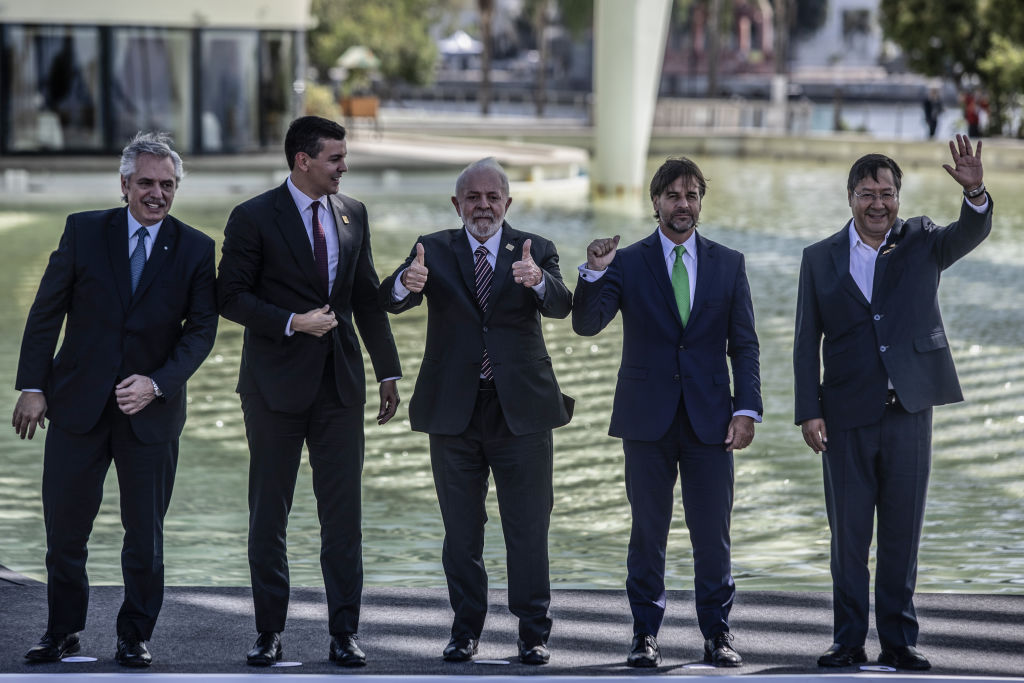BUENOS AIRES – Much has been made of Latin America’s relevance, or lack thereof, on the global stage. Paraguayan President Santiago Peña has an opinion on this too. According to him, the main obstacle to Latin America’s development is not physical or geographical, but mental, which is why the region needs to regain faith in its destiny to be great.
It’s one of the insights we gain through a new book, América Latina: La Visión de Sus Líderes (Latin America: The Vision of its Leaders), organized by Andrés Rugeles, vice-president of the think-tank Colombian Foreign Affairs Council and someone with experience in multilateral development banks, as well as in foreign policy. It offers an extensive and balanced examination of the current state and future trajectory of Latin America through the perspectives of some of its most influential leaders and intellectuals, and it’s a timely and significant contribution to the field at a moment when the region stands at a complex crossroads.
The book blends firsthand insights from influential figures such as former presidents Michelle Bachelet (Chile, 2014-2018), Mauricio Macri (Argentina, 2015-2019), and Iván Duque (Colombia, 2018-2022) with in-depth scholarly analysis of subjects ranging from poverty and inequality; to the environment and international insertion. Rugeles’s reflections, drawing on his experiences as an Academic Visitor at both Oxford University and the London School of Economics, are present throughout. This external view allows him to contextualize Latin America in a global perspective, effectively setting the stage for the reader in the interviews that follow.
One of the things that struck me most is the way in which the different issues—far from being static boxes—are interconnected and mutually reinforcing. This is particularly evident when reading the sections on poverty and inequality on the one hand, and democracy on the other. Rugeles and his interviewees clearly show how an increase in the former ultimately has a negative impact on the latter. As the author rightly points out, some democratic governments have not been able to satisfactorily address the challenges of development, leading to a growing disenchantment with the political system, which in turn largely explains the emergence of outsiders who challenge the establishment and put institutions to the test.
In the face of increasing global instability and insecurity due to drastic changes in geopolitics, the resurgence of great power competition, trade protectionism, and rising nationalist populism, the post-Cold War world is rapidly evolving. This “era of change” will undoubtedly transform geopolitics entirely, impacting governance, socialization, and production, posing significant challenges for future leaders. Latin America confronts these challenges from a fragile and divided position, lagging behind global powers due to persistent issues in social, economic, institutional, and environmental development. Politically, the region also suffers from institutional weaknesses and a “democratic recession.” Some governments exhibit increasingly autocratic tendencies, while the electorate has become notably polarized, showing diminished adherence to democratic values alongside rising violence and transnational organized crime.
The author has an accurate diagnosis of the current international scenario and how Latin America risks being trapped in irrelevance. To avoid this, Rugeles proposes five concrete measures that should guide Latin American foreign policy in a global scenario marked by interdependence and plurality: the defense of democratic principles, pragmatism, the construction of common agendas, respect for international law, and the defense and strengthening of multilateralism. These initiatives are taken up by the interviewees, who share their views on why the region is lagging behind the rest of the world and what actions are needed to make Latin America a Mecca of stability in a troubled world.
Rugeles’s book emphasizes the importance of adopting a comprehensive perspective to rethink our approach to overcoming political instability and ideological fragmentation. Latin America remains a beacon of resilience and perseverance, and despite its challenges, it has a vibrant and promising future, thanks to its wealth of natural resources, clean energy, diverse agriculture, and a talented and well-educated population. Rugeles calls for the emergence of a new kind of leadership with a clear vision for the future to leverage these assets. To achieve this, future Latin American leaders must dream bigger, act pragmatically, and build consensus to ensure prosperity for all.
América Latina: La Visión de Sus Líderes is a vital and timely contribution to the discourse on Latin America’s future. It is a must-read for policymakers, scholars, and anyone interested in the future of this dynamic and diverse region. This outstanding work serves as a crucial tool for envisioning Latin America’s future as what Rugeles calls a región solución or “a region of solutions.
—
Díaz is managing director at Cefeidas Group, an international advisory firm based in Argentina.





